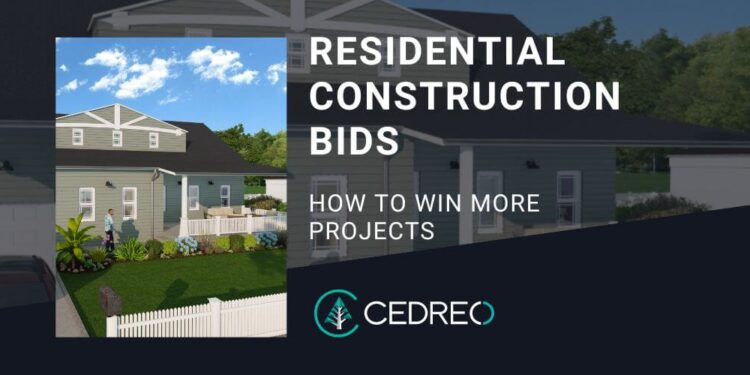As residential construction bids take the spotlight, this introduction invites readers into a realm of knowledge and expertise, promising an enlightening exploration of the topic.
The following paragraphs will delve into the intricacies of residential construction bids, shedding light on key components, influencing factors, bidding processes, and strategies for success.
Understanding Residential Construction Bids
Residential construction bids play a crucial role in the process of planning and executing construction projects for homes. These bids are essentially proposals submitted by contractors to potential clients, detailing the estimated costs and scope of work involved in the construction project.
Key Components of Residential Construction Bids
- Project Scope: This section Artikels the specific details of the project, including the type of construction, materials to be used, and any special requirements.
- Cost Breakdown: A detailed breakdown of costs, including labor, materials, permits, and any additional expenses, is provided to give the client a clear understanding of the overall pricing.
- Timeline: The proposed timeline for the project, including start and completion dates, helps the client assess the feasibility of the construction schedule.
- Contract Terms: Important terms and conditions, payment schedules, and warranties are typically included to ensure both parties are in agreement before commencing work.
Accurate and detailed bidding is essential in residential construction projects to avoid misunderstandings, cost overruns, and delays.
Importance of Accurate Bidding in Residential Construction Projects
- Client Expectations: Accurate bidding helps set clear expectations for the client regarding the costs and timeline of the project, fostering trust and transparency.
- Financial Planning: Clients can effectively plan their finances and secure necessary funding when provided with precise estimates from contractors.
- Project Management: Accurate bids enable contractors to effectively manage resources, schedule tasks, and deliver the project within the agreed-upon parameters.
- Legal Protection: A well-documented bid with accurate cost and scope details can protect both parties in case of disputes or disagreements during the construction process.
Factors Influencing Residential Construction Bids
When it comes to residential construction bids, there are several key factors that can significantly impact the overall cost of a project. Understanding these factors is crucial for both contractors and homeowners to ensure a smooth and successful construction process.
Project Size Impact
The size of a residential construction project plays a major role in determining the overall cost of the bid. Larger projects typically require more materials, labor, and time to complete, leading to higher bids. On the other hand, smaller projects may be more cost-effective due to reduced material and labor requirements.
Location Influence
The location of a residential construction project can also have a significant impact on the cost of bids. Factors such as local building codes, permits, availability of skilled labor, and proximity to suppliers can all affect construction costs. Urban areas tend to have higher construction costs compared to rural areas due to higher land and labor costs.
Materials and Labor Availability
The availability of materials and skilled labor in a specific area can greatly influence residential construction bids. Scarcity of materials or a shortage of qualified workers can drive up construction costs as contractors may need to source materials from further away or pay higher wages to attract skilled labor.
It is essential for contractors to consider these factors when preparing bids to ensure they accurately reflect the true cost of the project.
Types of Residential Construction Bidding Processes
When it comes to residential construction bidding, two common approaches are design-bid-build and design-build. Additionally, there are different methods like lump-sum bidding and cost-plus pricing that contractors use. Let's delve into the details of each process and understand their benefits and drawbacks.
Design-Bid-Build vs. Design-Build
In the design-bid-build approach, the project is divided into separate design and construction phases. First, the design is completed, and then bids are solicited from contractors based on the finalized plans. On the other hand, in the design-build approach, a single entity is responsible for both the design and construction of the project.
This integrated process can lead to faster project completion and better communication between the design and construction teams.
Lump-Sum Bidding vs. Cost-Plus Pricing
Lump-sum bidding involves submitting a fixed price for the entire project based on the plans and specifications provided. This method provides clarity on costs upfront but may lead to change orders if unexpected issues arise during construction. Cost-plus pricing, on the other hand, involves paying the contractor for the actual cost of construction plus an agreed-upon percentage for profit.
This method offers flexibility in case of changes but can lead to higher overall costs if not managed properly.
Benefits and Drawbacks
Design-bid-build allows for competitive bidding and clear separation between design and construction responsibilities. However, it can lead to adversarial relationships between the design and construction teams. Design-build promotes collaboration and faster project delivery but may limit the owner's involvement in the design process.
Lump-sum bidding provides cost certainty but may not account for unforeseen circumstances, while cost-plus pricing offers flexibility but requires careful cost management to prevent overruns.
Strategies for Winning Residential Construction Bids
When it comes to securing residential construction bids, there are several strategies that can help you stand out from the competition and increase your chances of winning the project.
Tips for Preparing a Competitive Residential Construction Bid
- Do a thorough analysis of the project requirements and scope to understand all the details.
- Provide a detailed and clear breakdown of costs, including materials, labor, and any other expenses.
- Showcase your past work and emphasize your experience and expertise in similar projects.
- Be realistic with your timeline and ensure you can deliver quality work within the specified timeframe.
- Offer competitive pricing without compromising on the quality of work.
The Importance of Accurate Cost Estimation in Winning Bids
Accurate cost estimation is crucial in winning residential construction bids as it demonstrates your professionalism, reliability, and understanding of the project requirements. A precise cost estimate helps build trust with the client and sets realistic expectations for both parties.
Establishing a Good Relationship with Subcontractors
Building strong relationships with subcontractors can positively influence bid outcomes by ensuring timely and quality work from all parties involved. Communicate effectively, provide clear instructions, and maintain a professional and respectful attitude to foster a collaborative working environment.
Closing Summary
In conclusion, mastering the art of residential construction bids is crucial for success in the industry. By understanding the nuances of bidding processes and implementing effective strategies, one can secure profitable projects and build a reputable business.
FAQ Guide
How important is accurate bidding in residential construction projects?
Accurate bidding is essential in residential construction projects to avoid cost overruns and ensure profitability.
What is the difference between lump-sum bidding and cost-plus pricing methods?
Lump-sum bidding offers a fixed price for the entire project, while cost-plus pricing involves paying the actual cost of materials and labor plus a fee.
How can project size impact residential construction bids?
Project size can influence bids as larger projects may require more resources and manpower, affecting the overall cost.














